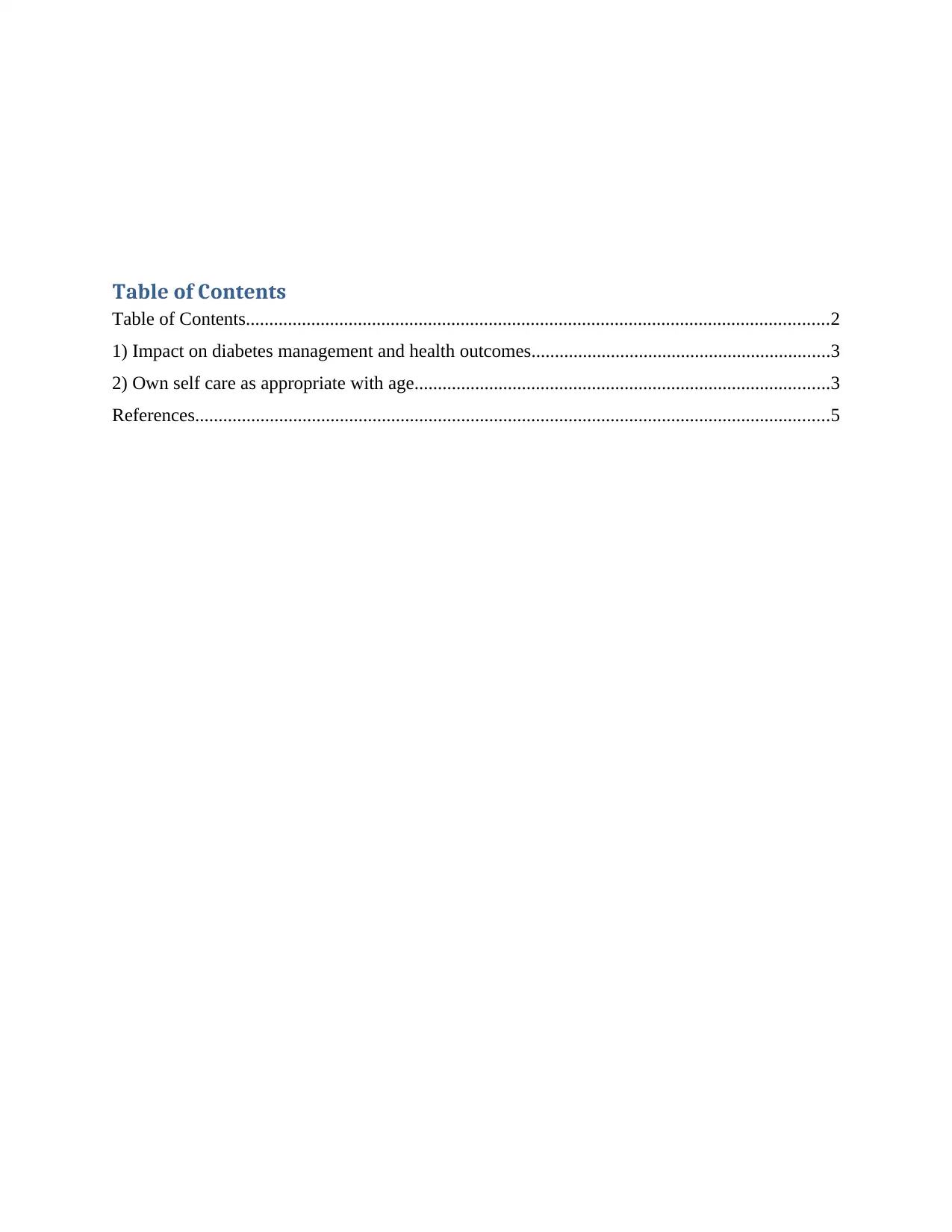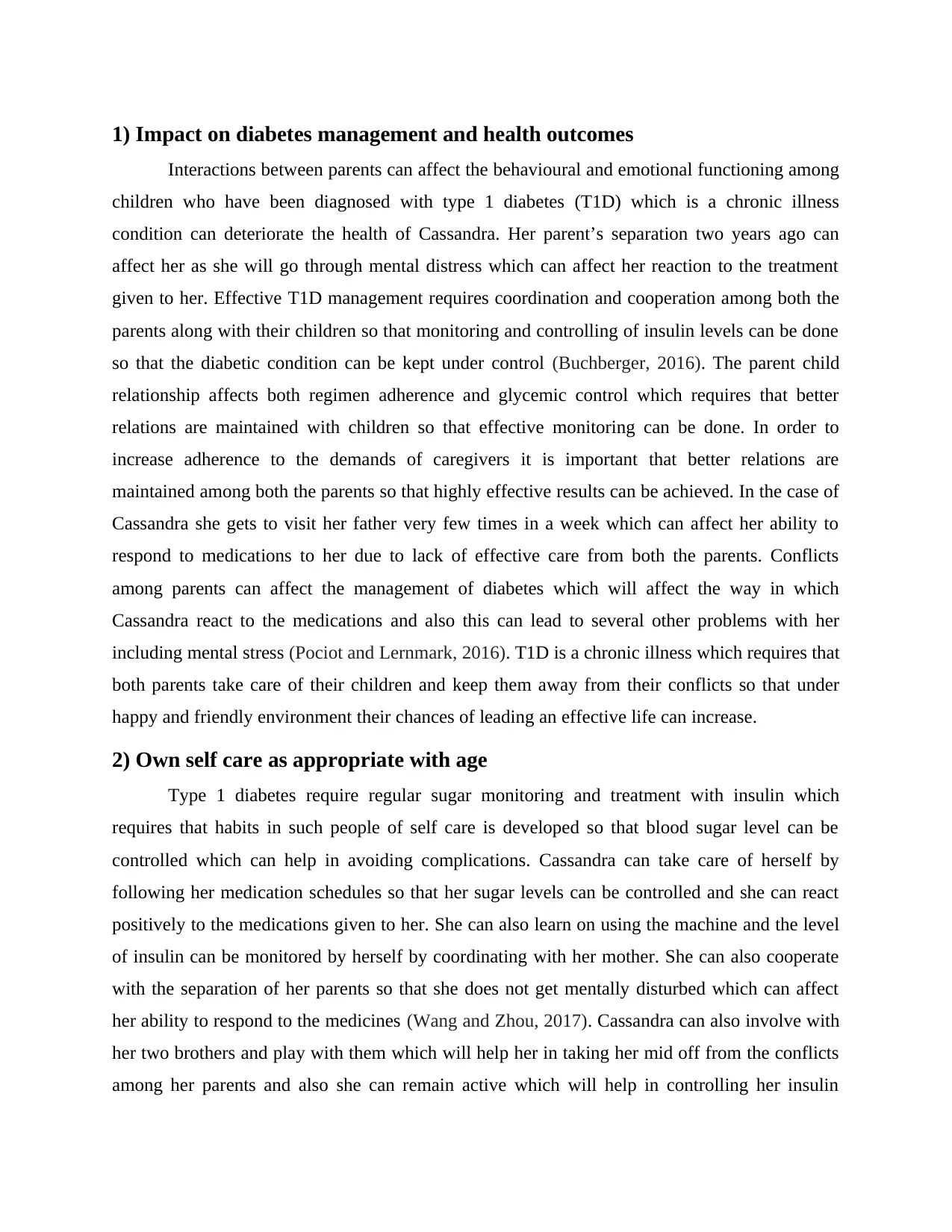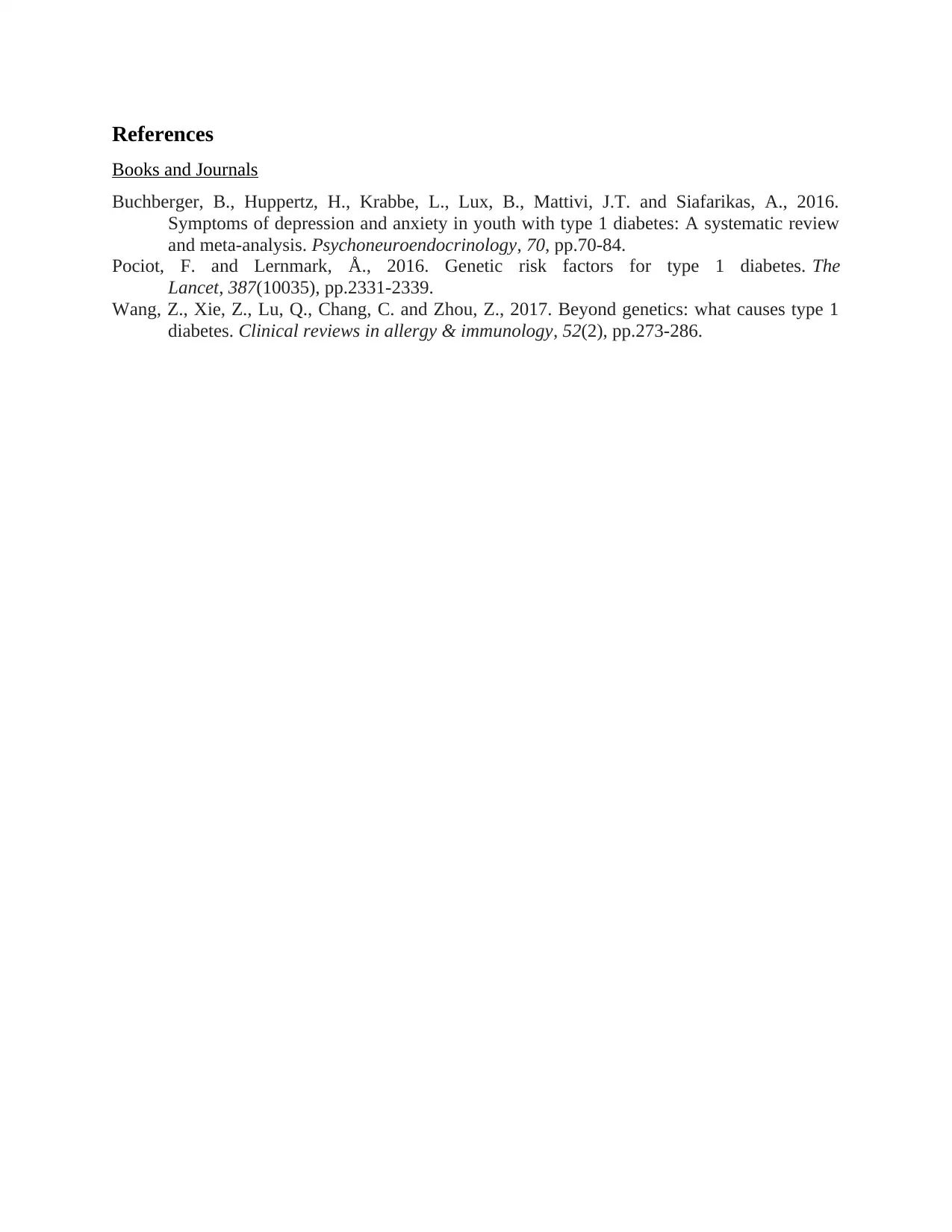Case Study: Impact of Parental Conflict on Type 1 Diabetes Management
VerifiedAdded on 2023/01/06
|5
|719
|90
Case Study
AI Summary
This case study examines the impact of parental conflict on the management and health outcomes of a child, Cassandra, diagnosed with Type 1 Diabetes (T1D). The analysis highlights how parental separation and conflict can lead to mental distress, affecting the child's response to medication and overall well-being. The study emphasizes the importance of parental cooperation, effective communication, and a supportive environment for successful T1D management, including adherence to treatment and glycemic control. It also explores the role of self-care, age-appropriate routines, and positive interactions with family members in helping Cassandra manage her condition and maintain mental stability. References to relevant research are included to support the analysis.

Case Study
Paraphrase This Document
Need a fresh take? Get an instant paraphrase of this document with our AI Paraphraser

Table of Contents
Table of Contents.............................................................................................................................2
1) Impact on diabetes management and health outcomes................................................................3
2) Own self care as appropriate with age.........................................................................................3
References........................................................................................................................................5
Table of Contents.............................................................................................................................2
1) Impact on diabetes management and health outcomes................................................................3
2) Own self care as appropriate with age.........................................................................................3
References........................................................................................................................................5

1) Impact on diabetes management and health outcomes
Interactions between parents can affect the behavioural and emotional functioning among
children who have been diagnosed with type 1 diabetes (T1D) which is a chronic illness
condition can deteriorate the health of Cassandra. Her parent’s separation two years ago can
affect her as she will go through mental distress which can affect her reaction to the treatment
given to her. Effective T1D management requires coordination and cooperation among both the
parents along with their children so that monitoring and controlling of insulin levels can be done
so that the diabetic condition can be kept under control (Buchberger, 2016). The parent child
relationship affects both regimen adherence and glycemic control which requires that better
relations are maintained with children so that effective monitoring can be done. In order to
increase adherence to the demands of caregivers it is important that better relations are
maintained among both the parents so that highly effective results can be achieved. In the case of
Cassandra she gets to visit her father very few times in a week which can affect her ability to
respond to medications to her due to lack of effective care from both the parents. Conflicts
among parents can affect the management of diabetes which will affect the way in which
Cassandra react to the medications and also this can lead to several other problems with her
including mental stress (Pociot and Lernmark, 2016). T1D is a chronic illness which requires that
both parents take care of their children and keep them away from their conflicts so that under
happy and friendly environment their chances of leading an effective life can increase.
2) Own self care as appropriate with age
Type 1 diabetes require regular sugar monitoring and treatment with insulin which
requires that habits in such people of self care is developed so that blood sugar level can be
controlled which can help in avoiding complications. Cassandra can take care of herself by
following her medication schedules so that her sugar levels can be controlled and she can react
positively to the medications given to her. She can also learn on using the machine and the level
of insulin can be monitored by herself by coordinating with her mother. She can also cooperate
with the separation of her parents so that she does not get mentally disturbed which can affect
her ability to respond to the medicines (Wang and Zhou, 2017). Cassandra can also involve with
her two brothers and play with them which will help her in taking her mid off from the conflicts
among her parents and also she can remain active which will help in controlling her insulin
Interactions between parents can affect the behavioural and emotional functioning among
children who have been diagnosed with type 1 diabetes (T1D) which is a chronic illness
condition can deteriorate the health of Cassandra. Her parent’s separation two years ago can
affect her as she will go through mental distress which can affect her reaction to the treatment
given to her. Effective T1D management requires coordination and cooperation among both the
parents along with their children so that monitoring and controlling of insulin levels can be done
so that the diabetic condition can be kept under control (Buchberger, 2016). The parent child
relationship affects both regimen adherence and glycemic control which requires that better
relations are maintained with children so that effective monitoring can be done. In order to
increase adherence to the demands of caregivers it is important that better relations are
maintained among both the parents so that highly effective results can be achieved. In the case of
Cassandra she gets to visit her father very few times in a week which can affect her ability to
respond to medications to her due to lack of effective care from both the parents. Conflicts
among parents can affect the management of diabetes which will affect the way in which
Cassandra react to the medications and also this can lead to several other problems with her
including mental stress (Pociot and Lernmark, 2016). T1D is a chronic illness which requires that
both parents take care of their children and keep them away from their conflicts so that under
happy and friendly environment their chances of leading an effective life can increase.
2) Own self care as appropriate with age
Type 1 diabetes require regular sugar monitoring and treatment with insulin which
requires that habits in such people of self care is developed so that blood sugar level can be
controlled which can help in avoiding complications. Cassandra can take care of herself by
following her medication schedules so that her sugar levels can be controlled and she can react
positively to the medications given to her. She can also learn on using the machine and the level
of insulin can be monitored by herself by coordinating with her mother. She can also cooperate
with the separation of her parents so that she does not get mentally disturbed which can affect
her ability to respond to the medicines (Wang and Zhou, 2017). Cassandra can also involve with
her two brothers and play with them which will help her in taking her mid off from the conflicts
among her parents and also she can remain active which will help in controlling her insulin
⊘ This is a preview!⊘
Do you want full access?
Subscribe today to unlock all pages.

Trusted by 1+ million students worldwide

levels. Cassandra’s mom can also develop the habit in her of following a regular routine that can
help in managing the sugar levels in Cassandra. Further in order to take care of self Cassandra
can also increase interaction with both her parents so that she can remain positive and happy
which can help her in remaining mentally stable. This will also help her to remain prepared
during the separation along with managing her health condition.
help in managing the sugar levels in Cassandra. Further in order to take care of self Cassandra
can also increase interaction with both her parents so that she can remain positive and happy
which can help her in remaining mentally stable. This will also help her to remain prepared
during the separation along with managing her health condition.
Paraphrase This Document
Need a fresh take? Get an instant paraphrase of this document with our AI Paraphraser

References
Books and Journals
Buchberger, B., Huppertz, H., Krabbe, L., Lux, B., Mattivi, J.T. and Siafarikas, A., 2016.
Symptoms of depression and anxiety in youth with type 1 diabetes: A systematic review
and meta-analysis. Psychoneuroendocrinology, 70, pp.70-84.
Pociot, F. and Lernmark, Å., 2016. Genetic risk factors for type 1 diabetes. The
Lancet, 387(10035), pp.2331-2339.
Wang, Z., Xie, Z., Lu, Q., Chang, C. and Zhou, Z., 2017. Beyond genetics: what causes type 1
diabetes. Clinical reviews in allergy & immunology, 52(2), pp.273-286.
Books and Journals
Buchberger, B., Huppertz, H., Krabbe, L., Lux, B., Mattivi, J.T. and Siafarikas, A., 2016.
Symptoms of depression and anxiety in youth with type 1 diabetes: A systematic review
and meta-analysis. Psychoneuroendocrinology, 70, pp.70-84.
Pociot, F. and Lernmark, Å., 2016. Genetic risk factors for type 1 diabetes. The
Lancet, 387(10035), pp.2331-2339.
Wang, Z., Xie, Z., Lu, Q., Chang, C. and Zhou, Z., 2017. Beyond genetics: what causes type 1
diabetes. Clinical reviews in allergy & immunology, 52(2), pp.273-286.
1 out of 5
Related Documents
Your All-in-One AI-Powered Toolkit for Academic Success.
+13062052269
info@desklib.com
Available 24*7 on WhatsApp / Email
![[object Object]](/_next/static/media/star-bottom.7253800d.svg)
Unlock your academic potential
Copyright © 2020–2026 A2Z Services. All Rights Reserved. Developed and managed by ZUCOL.





